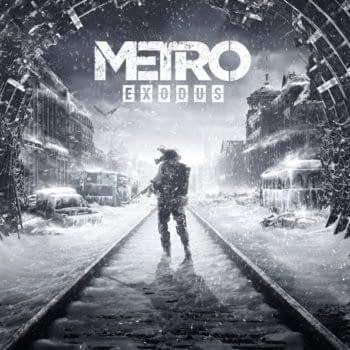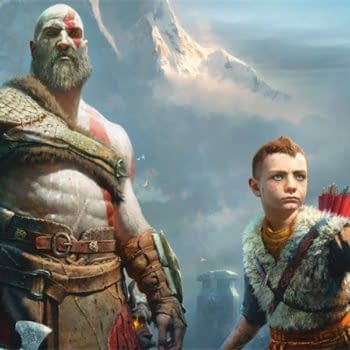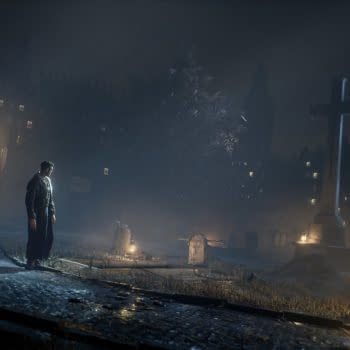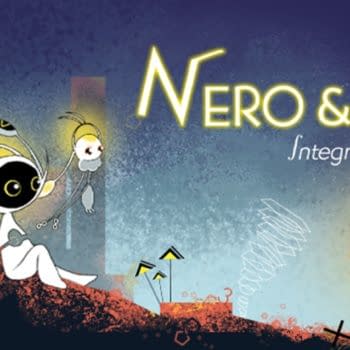Posted in: Games, Recent Updates, Video Games | Tagged: entertainment, everybody's gone to the rapture, games, playstation, playstation 4, sony, the chinese room, video games
Everybody's Gone To The Rapture Review – Give Us A Tick Love, Just Poppin' Down T'Rapture

The game is what the industry has finally landed on calling a First Person Experience (FPX), or rather, if you are being derogatory to the game, a walking simulator. Much like Gone Home, The Vanishing of Ethan Carter or developer of Everybody's Gone To The Rapture, The Chinese Room's memorable Dear Esther, these games place in you a location as you move from spot to spot to learn a little about the story. They have been controversial for a while now, as a lot of gamers feel they take away the kind of interactivity and agency you'd expect from a traditional games. They also often come under the 'artsy indie' umbrella which can turn a lot of people off. Everybody's Gone To The Rapture absolutely is that kind of game. In fact, it might be one of the most indulgent in these descriptors, so if you don't like games in this genre, I can say right now, Everybody's Gone To The Rapture is not for you. It's slow paced, low key and has no puzzle solving or anything. It's purely an experience.
If you don't try it though, I honestly think you'd be missing out on what is quite a special journey. Set in a fiction Shropshire town, the game throws you into a world frozen in time. There is no one to be seen, just the remnants of a village that has disappeared, from beer bottles left on the table at the pub, to sheets left on the clothing line. It is clear something happened, and you are tasked with slowly figuring out how this came to pass. And it's not like this all happened in an instant either. This was a slow, and at times, horrific event that saw these people disappear. All you have to guide you are aetheric lights that seem to have captured moments within the village in formed memories. You see the run up to this disappearance and find out both the bigger implications of what caused this disappearance, as well as the day to day life of the village's inhabitants. The juxtaposition of the end of the world and the menial interactions of common villagers creates this push and pull of content that makes the entire game 'feel' quite profound.
As I said, this isn't the kind of game you'd expect from…well, being a game. Even though it is dealing with end of the world implications, that doesn't feel like the focus. This presents itself much more like Thomas Hardy's classic literature infused with a slight and understated sci-fi edge, rather than pretty much anything you will find at your local game store. There is something refreshing about it though. It's pretentious and arty to the point of being overbearing, sure, but that feels like partially the point. It's about showing what else games can be, in relation to what we expect from a game. This is probably more likely to please a reader of slower books than it is most gamers. But then, that is also one of the places the game fails.
A lot has been made about the game's walking speed, and yes, it is incredibly slow. Even with the news that there is a hidden button in the game that allows you to 'sprint', it feels very slow. This is a huge problem for a game that is primarily about getting from one place to the next. I understand that choice, which is about pacing of the story and the speed at which you experience the game, but I found it actually discouraged me from exploring, which is what the whole game is about. Sometimes I realized I missed a slip road after exploring an area, before just deciding the 5-10 minutes it would take me to go back and return might not be worth it. It's a problem with the design, even if I can see the logic behind the decision.
This does lead to one of the true delights of the game though. This space, once you acclimatize to the pace at which you move, is a joy to explore. I grew up in a scenic village much like this one, so it poked at a lot of tangible memories I already had. It's a lovingly recreated space that is breathtaking in its small English town kind of way. The setting is so opposite and human compared to what you might expect from an end of the world story, that it actually sheds a lot more light on areas we don't often see explored in these kinds of stories. The sound design is a true treat too. As the birds ring across the picturesque scenery and the grass bends under foot, it all feels authentic in its resplendence.
And now we come to the music, which is one of the most complex issues with the game. The soundtrack by Jessica Curry is gorgeous beyond pale. This might be one of the angelic and unique sountracks that any game has ever seen. It is beautiful and not at all what we hear in games all too often. Having said that, while it is a joy to listen to, it has to be said, in game it can be a little overbearing. It isn't very subtle, and at key points in the game it can try and oppose an emotion upon you in a heavy handed way. I also found at points, that the emotion it was trying to convey didn't quite mesh with what I was actually feeling about what had just happened. It's jarring and felt like it took away from my own interpretation of events. Again, that is not to say anything against the actual composition. This might be one of the most striking game scores I've heard in a long time and it will likely remain in my listening rotation for quite a while.
Everybody's Gone To The Rapture is a unique experience that won't be for everyone, but nor is meant to be. While I'd encourage everyone to give it a go and find their own experience with the title, the slow pace and lack of agency might just not be your thing. If you do stick with it though, you will find a beautiful game that evokes feelings that games don't often touch. Games like this are important for the medium , even if just for the reason of poking at the seams of what video games can be and what they can be about. While I am not entirely convinced the story hangs together as well as it needs to, that doesn't take away from the quaint, yet impactful experience about love, loneliness, the power of self, the frivolity of self, our place in our own lives and our place in the universe. This is a game about the big things and the small things and how the two are entwined in a significant way. As I said, it is prentious as all hell, but that is the charm. If you are willing to get on its level, Everybody's Gone To The Rapture should be something fairly profound for you. It's an achievement that you should witness, one that doesn't necessarily all work, but an achievement none the less. I have no qualms about recommending.
.















